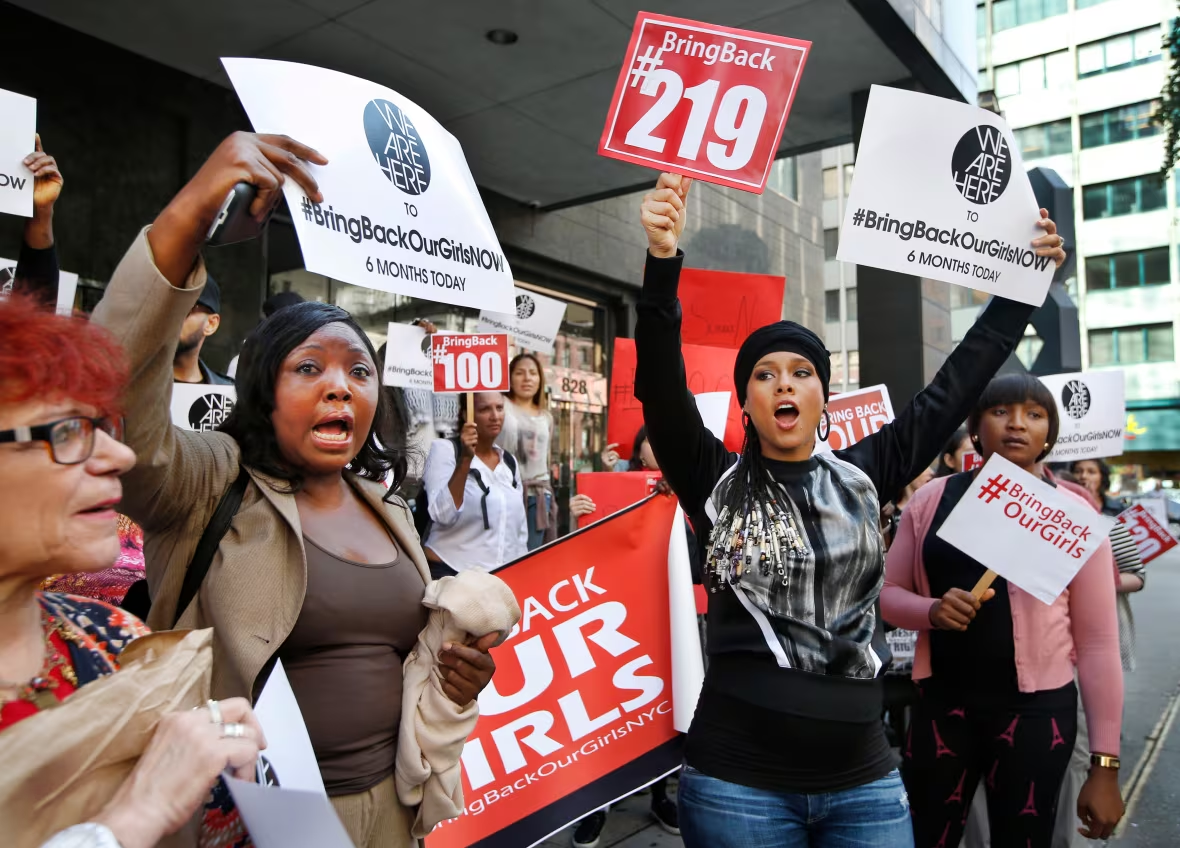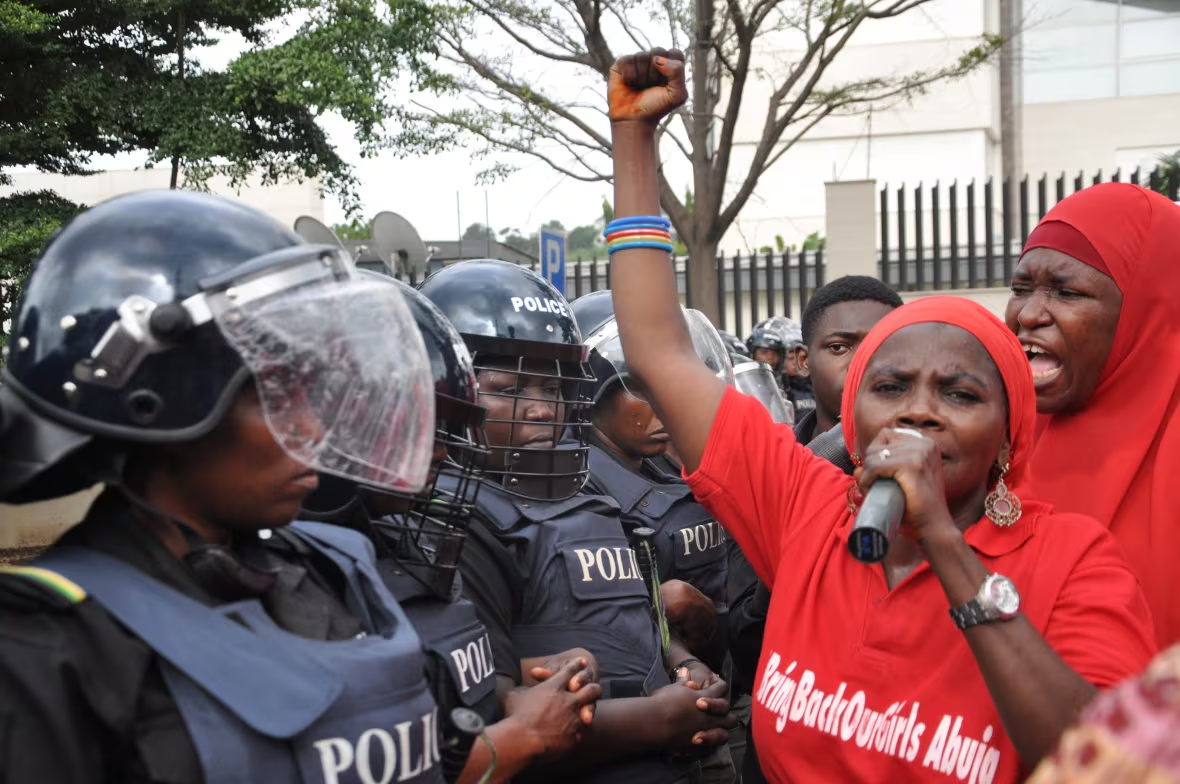Nigerian schoolgirls kidnapped by Boko Haram: protests but no rescue
'Hope is now fading fast,' leader of parents group says

Chanting "Bring back our girls now, and alive," Nigerian protesters gathered outside the presidential residence in Abuja, the capital, on Tuesday.
They were demanding the Nigerian government do more to free the 200 or so schoolgirls still held captive by Boko Haram six months after the mass kidnapping from a school in Chibok, northern Nigeria.
Hosiah Lawan, a leader of the Chibok parents organization, told the crowd that, "hope is now fading fast," Reuters reported.
Protests also took place in London, U.K. and New York.
- Boko Haram releases 27 hostages, including wife of Cameroon's vice-prime minister
- TIMELINE | Nigeria schoolgirls abduction
Boko Haram, which wants to form its own Islamic state, carried out the kidnapping at the girls school during the night of April 14-15. It's estimated that 276 students were abducted, but some have escaped - most recently, four of the girls turned up Sunday in Nigeria after walking for three weeks following their escape from captivity in neighbouring Cameroon.
About 200 are believed to still be in Boko Haram's clutches.
Held as slaves
In early May, Boko Haram leader Abubakar Shekau stated in a video that the students "will remain slaves with us."
Later that month, Nigeria's Chief of Defence Staff, Alex Badeh, claimed the girls had been located but ruled out a rescue as too dangerous. "We can't go and kill our girls in the name of trying to get them back."
Meanwhile, a global campaign pushing for the girls' release generated millions of tweets using the hashtag #BringBackOurGirls. The U.S. government and others offered to help.
Since then, there have been accounts of other abductions (including releases and escapes) and attacks by Boko Haram, as well as reports of back-channel talks between the group and the Nigerian government over the former's demand for the release of their jailed comrades in return for the girls.
Nevertheless, there has been no visible progress in the efforts to free the girls.
Still no rescue attempt
How could a group, officially labelled "terrorist" by the U.S. government in 2013 and the U.N. Security Council in May 2014, succeed in holding so many people for six months?
Omolola Adele-Oso, a Nigerian living and working in the the U.S., points to "the ineptness of the Nigerian government when it comes to issues of public safety."

She is one of the founders of the group Act4Accountability, which has helped lead the campaign in the west for the release of the Chibok schoolgirls. The group was started in May and brings together members of the African diaspora in the U.S.
Adele-Oso says there's frustration with the Nigerian government on a number of levels. "Keeping in touch with the family members of these missing girls is a basic, basic thing that needs to be done – that's not happening."
She calls on the Goodluck Jonathan government to "at least tell us something.
"We're not hearing anything from the Nigerian government and, of course, when there's no response we assume you're really not doing all you need to," she adds.
She also angry about the president's re-election campaign using #BringBackGoodluck2015. The vote takes place in February.
War 'not going well'
Jonathan Hill teaches at King's College London and authored the 2012 book Nigeria since Independence: Forever Fragile?. He explains that "the unprecedented global campaign to find and free" the Chibok schoolgirls was in part directed at the Nigerian government because, "The inexplicable withdrawal of the soldiers guarding the school from which they were taken, Abuja’s reluctant and week-late admission that they had been kidnapped, and the security forces' abject failure to pursue what leads they had in a timely fashion gave rise to serious doubts about the federal government’s competence and desire to save the girls."

"Boko Haram is not on the cusp of defeat, but continues to mount attacks and evolve," Hill wrote for the Combatting Terrorism Center at West Point at the end of July.
In the past few months Boko Haram has changed tactics so that it is now holding onto towns it targets, rather than simply carrying out hit-and-run attacks. The group is reported to be responsible for the killing of 3,000 people in Nigeria this year.
Hill writes that, "Boko Haram’s ability to exploit national borders has enabled its leaders and forces to plan, prepare and recuperate in relative safety, and avoid detection and neutralization by Nigeria’s security forces."
He also notes a growing influence over Boko Haram by al-Qaeda in the Maghreb.
The U.S. tries to step up

The White House marked the six-month anniversary of the mass kidnapping by issuing a statement saying, "President Obama has directed that the U.S. government do everything it can to help the Nigerian government find and free the abducted girls and, more broadly, to combat Boko Haram."
Their goal: "to dismantle this murderous group."
The statement also provides details about the U.S. effort, which includes sending "a multi-disciplinary team" to advise the Nigerian government, providing them with "intelligence, surveillance, and reconnaissance," and a new $40 million fund for for Cameroon, Chad, Niger, and Nigeria to help counter Boko Haram.
Adele-Oso welcomes the U.S. assistance, but says "their hands are tied, they can only offer - it's up to the Nigerian government as to what they want to accept."
Hill says, "It is not entirely clear why Abuja is unwilling to work more closely with either the United States or the United Kingdom. Likely reasons include national pride and a possible reluctance to expose the Nigerian military’s operating practices to closer scrutiny."

Hill adds that, "Certainly Nigeria’s army has been heavily criticized on occasion for its heavy and indiscriminate use of force."
Meanwhile, those pushing for the release of the kidnapped girls are maintaining pressure on the Nigerian government. Adele-Oso says Act4Accountability will continue to "speak up and show up at the Nigerian embassy or places where Nigerian delegates are gathering."
"Until these girls are brought back, the pressure is kept on the Nigerian government to make sure it does what it is supposed to do."
With files from Reuters